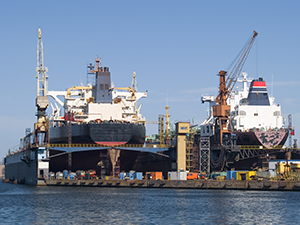905B Claims or “Shore-Based Injury” Claims & Lawsuits

A 905 B claim is an injury claim filed against a thirty party other than the worker’s employer. 905B claims are for those workers injured while providing land based services such as ship repair or maintenance, ship building or other land or shore based work on vessels and ships. When these workers get injured and they are able to show that their injuries were caused by the ship owner, then they can file a 905b negligence or tort action against the ship owner.
A 905b claim is based on negligence, therefore if the 905b worker is proved to be more negligent than the ship owner, then there would be no recovery on such claim, unlike injuries under the Jones Act or State worker’s compensation. Such ship or vessel owner negligence most often occurs where the ship has a dangerous condition or defect or in situations where the ship owner or one of the vessel’s crew was negligent and such negligence caused or contributed to the injury to the worker. This statute or its benefits do not apply if the injured longshoreman was injured by a fellow longshoreman that was also working on the vessel or providing needed services to the vessel.
Which Maritime Law Apply?
The fact that a worker is working on or near the water, does not automatically qualify that injured worker to the Jones Act, General Maritime Laws or maritime injury legal rights. In many cases injured workers on the docks at riverports, shipyards terminals and ports are only able to qualify for State Worker’s Compensation. Stevedores due to the nature of the way most of them are contracted by the vessel owner or operator, stevedores may not have a claim under 905b, but rather only State Worker’s Comp. Remember stevedores are not the same as a longshoreman even though may at times do similar tasks. The legal difference often lies in the way they were contracted and what the contract of employment states.
The determination of whether an injured worker is a 905b claimant, a Jones Act seaman or claimant under State Worker’s Compensation is often a difficult one to map out based solely on what happened. An experienced maritime attorney that understand the complexities of the Jones Act , 905 B, and the implications of the Longshore and Harbor Workers’ Compensation Act (LHWCA) is often needed to help the injured worker maximize his benefits and protect his legal rights.
Filing Deadlines in Maritime and Shore Based Injury Cases
Another danger zone for injured workers deals with important statute of limitations or filing deadlines or time limit to file that must be followed in order to ever even have a claim or lawsuit, no matter what the facts and how badly the worker is hurt. The Statute of Limitations for filing a Jones Act case is 3 years for the date of the incident. Claims under 905b also have a 3 year statute of limitations, however an injured worker needs to be very careful and should consult a 905b lawyer as even though it is a 3 yr filing deadline some 905B claims are really more applicable to be filed under state based negligence or tort law and as such filing deadlines for state based causes of actions and claims need to be filed sometimes as early as ONE YEAR from the date of the incident. Those workers that wait too long, their legal rights may be lost or expired due to a missed Statute of Limitations error or calculation.
Talk to a Maritime Injury Lawyer Now
It is because of the confusing nature of these laws, the injured worker needs to talk to a maritime attorney about their case. These legal traps that are easy to fall into when dealing with all the laws dealing with 905B Claims vs. Jones Act Claims vs. LHWCA benefits vs. State Worker’s Comp vs. Negligence or Tort Claims and Causes of Actions and Lawsuits under State Law. Call now and talk to a trial lawyer with over 30 years of experience at 1-800-883-9858 or fill out the online form and we will promptly call you back.
.jpg)